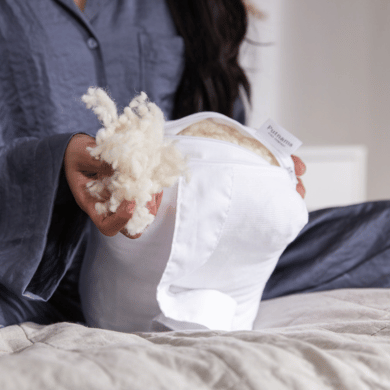
Wool vs Synthetic Bedding: Which Is Better?
We spend around a third of our life in bed – even more, if you read to relax before you fall asleep. So investing in high-quality bedding that helps you drift off peacefully and stay asleep throughout the night has a huge impact on your health and wellbeing.
There are plenty of options for bedding materials, including synthetic materials and natural products like wool bedding. The question is, which is better for you?
The pros and cons of wool vs synthetic bedding
Wool
Wool is a durable and sustainable natural by-product of sheep shearing, meaning it doesn’t have an impact on the environment. That goes double for the British wool used in Putnams wool bedding, which comes from sheep that enjoy some of the highest animal welfare standards in the world.
This material is also hypoallergenic, naturally repelling mould, mildew, dust mites and other allergens that could disturb your sleep. It is highly breathable and wicks away moisture to balance your temperature and prevent night sweats, and has even been shown to extend stage 4 regenerative sleep by up to 25%.
On the other hand, wool bedding tends to be more expensive. While you can pick up a polyester double duvet for as little as £15, even a lightweight summer British wool duvet can cost a lot more. It’s a small price to pay for deep, restorative sleep that leaves you feeling refreshed and energetic, but it does mean a higher upfront cost.
Synthetic
Synthetic bedding materials like recycled polyester are much cheaper and easier to produce than natural fillings such as British wool or organic buckwheat hulls. That helps drive down the price, making synthetic bedding much more affordable. They’re also much easier to wash, and some are softer to the touch.
Unfortunately, even high-quality synthetic bedding tends not to be as durable as all-natural alternatives like wool. Even if they are, they don’t bring with them the deep-sleep benefits of wool bedding. So while you might save a few pounds, you could end up paying for it dearly in the long run – both from your wallet and your health.
Is wool or synthetic bedding better for winter?
Both wool bedding and synthetic bedding will keep you warm in bed, especially during the cold winter months. But the way each material does this is different.
Wool fibres trap air inside your duvet, pillow and mattress topper, giving you a warm layer of insulation to protect you against the cold. Fun fact: this same quality also helps you stay cool during hot summer nights, meaning you can sleep comfortably with warm bedding all year round!
Synthetic bedding, on the other hand, keeps you warm by trapping heat under the covers with you. That makes it much easier to overheat even when it’s cold out, which could wake you in the middle of the night with a sweaty, clammy feeling that makes it harder to fall back asleep.
How to choose between wool and synthetic bedding?
If you’re looking to stay warm in winter (or cool in summer) a wool duvet, pillow and mattress topper is definitely the way to go. Wool is also more durable than synthetic materials, and creates a sleep environment that lends itself to deeper, more restorative rest.
However, if you prefer a softer feel and aren’t bothered about temperature, synthetic bedding might be a better choice. That’s because manmade materials can be delicately engineered and treated for artificial smoothness.
As a rule of thumb, natural bedding is always better for you and your family.
Why do people prefer wool bedding?
A better question is: what’s not to love?
Wool is hypoallergenic, so won’t agitate your asthma, allergies or sensitivities. And its natural scent actually repels dust mites and bed bugs to keep your bed clean.
There’s also the fact that it’s naturally temperature regulating, keeping you warm in colder months and cool when it’s hot outside. Wool’s moisture-wicking capabilities help prevent clamminess and night sweats, too. And since wool is naturally flame retardant, it doesn’t need additional chemical treatments to meet British fire standards.
Lastly, as a natural by-product from well-kept sheep, organic British wool is sustainable and biodegradable at the end of life. So by sleeping with wool bedding, you’re also doing your bit to help the planet.
Are there any downsides to wool bedding?
While wool is more durable than many synthetic bedding materials, it’s admittedly outclassed by polyester. But it lasts much longer than cotton bedding because it retains its loft – that is, its softness – even after cleaning.
Wool also comes with a higher upfront cost than synthetic bedding, though its durability means you won’t typically need to replace it as often. However, investing in high-quality natural bedding is worth it to support the health and wellbeing of you and your family.
Where can I buy high-quality organic British wool bedding?
As a trusted manufacturer of handmade British wool bedding, you have plenty of choice right here in the Putnams range.
We provide luxurious wool pillows, duvets and mattress toppers, including speciality items like knee pillows, pregnancy pillows, anti-snoring contour pillows and more.
Shop Putnams 100% British wool pillows and duvets today to enjoy blissful sleep night after night after night.





















Leave a comment